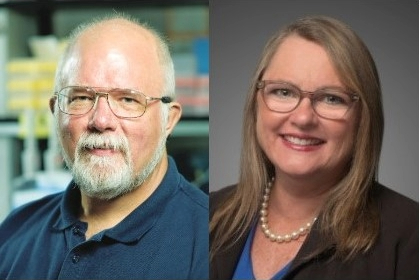(MARCH 12, 2024) Russell Tracy, Ph.D., director of the Laboratory for Clinical Biochemistry Research, and Mary Cushman, M.D., M.Sc., co-director of the Vermont Center for Cardiovascular and Brain Health, commented to the Burlington Free Press about a study of COVID-19 vaccine efficacy.

Russell Tracy, Ph.D., director of the Laboratory for Clinical Biochemistry Research (left), and Mary Cushman, M.D., M.Sc., co-director of the Vermont Center for Cardiovascular and Brain Health
(MARCH 12, 2024) Russell Tracy, Ph.D., professor of pathology & laboratory medicine and biochemistry, director of the Laboratory for Clinical Biochemistry Research, and Mary Cushman, M.D., M.Sc., professor of medicine and pathology & laboratory medicine, co-director of the Vermont Center for Cardiovascular and Brain Health, commented to the Burlington Free Press about a study of COVID-19 vaccine efficacy.
The study, conducted by Cushman, Tracy, and colleagues, revealed that certain people—including men, persons over the age of 65, those with higher weight, diabetics, smokers and those with a history of emphysema—produced fewer antibodies after receiving a COVID vaccine and had a reduced immune response and, therefore, reduced protection from the virus. On the other hand, some people—those who received the Moderna vaccine as opposed to Pfizer, and people who had previously had a serious bout of COVID that required hospitalization some time before receiving the vaccination—showed a significantly higher amount of antibody production and a slightly better immune response.
“I’m so proud of our lab’s team, especially lead technician Danielle Parent, who developed the methods and training materials to get the dried blood spots from over 20,000 people safely to Vermont, which allowed the study measurements,” said Tracy.
“Findings suggest the idea of a nuanced approach to vaccination, where certain population segments with weaker immune responses might need more frequent boosters or higher vaccine doses,” Cushman said.
As a result of this research, changes could be made to COVID immunization administration to help the vaccines better protect some people.
Read full story
at
Burlington Free Press